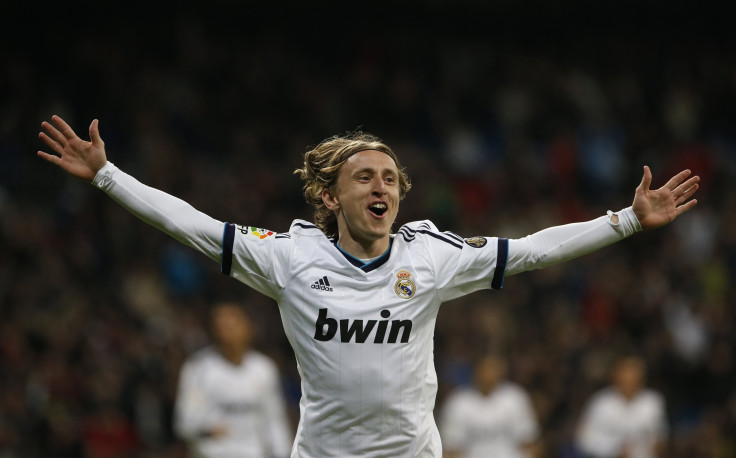Luka Modric Transfer News: Will Arsenal, Manchester United And Tottenham Target Return To The Premier League From Real Madrid?

Exactly a year ago Luka Modric was front and center in the transfer window’s most in-vogue saga, before eventually sealing his dream move to Real Madrid. Fast forward to today and it is his former Tottenham accomplice Gareth Bale that is dominating the off-season column inches as Real Madrid prepare to break the transfer record to secure the Welsh attacker. Modric, meanwhile, is barely an afterthought and may even be dispensed with by the Spanish giants to help fund their unprecedented an unprecedented that shows Florentino Perez has not lost his Galacticos urgings.
Bale’s desire to push through a move this summer is perhaps in part down to his knowledge that the game is a fickle business. A myriad of factors can take a player from one of the world’s most sought after to mere benchwarmer.
Modric’s first, and perhaps only, season in Madrid suffered a particularly ignominious nadir when he was voted by readers Madrid sports daily Marca as the worst La Liga signing of 2012. In fairness to the Croatian, things did improve -- notably with a spectacular goal to take his side through to the quarterfinals of the Champions League at Manchester United’s expense. In truth, though, he never truly made an impression in the side. While he made a respectable 25 starts in the league, many of those occurred after manager Jose Mourinho had conceded the title and used La Liga to rest his key men for the club’s and his obsession of claiming the Champions League.
In many ways Modric’s struggles at Madrid were easily foreseeable. With Xabi Alonso an integral player in the side playing the deep playmaking role and Mesut Ozil providing more dynamism and goal-scoring threat than Modric offers in the advanced midfield role, it was difficult to understand why Madrid were going to such lengths to pry him from Tottenham and eventually pay a fee of around £33 million. With both a deep-lying passer in Asier Illarramendi and a highly skilled advanced schemer in Isco being signed for around €30 million each this summer, Modric’s role looks likely to be further marginalized.
That is not to say that Modric does not remain a quality operator. The 27-year-old was one of the best creative players during his time in the Premier League and had a particularly impressive Euro 2012 -- not least against Spain, which may well have persuaded Madrid to go the extra mile to procure him. A superb passer of the ball, he can also maintain possession under pressure with his quick feet and proved doubters wrong about his perceived lack of physicality when he flourished in an orthodox midfield two at Tottenham.
It is easy to understand then why the likes of Manchester United, Arsenal and even former club Tottenham are being linked with a move to bring him back to England. Yet, at first glance it is debatable whether he is a natural fit at any of those reported suitors.
Tottenham, who according to speculation have asked for Modric to be included in any deal for Bale, is surely a non-story. While he may reluctantly be prepared to concede defeat and walk out of Madrid after just a single season, the prospect of him opting to go back to a club he fought so desperately to extract himself from a year ago is surely unthinkable.
Across North London, Modric is on paper an archetypal Arsenal player and Arsene Wenger would surely be an admirer. But, with Jack Wilshere and Santi Cazorla in the side, Modric certainly shouldn’t be a primary target of the cash with which the Gunners suddenly appear to be flush.
Manchester United is a more interesting proposition. The club was interested in the player in both the summer in which he went to Madrid and the one before when even a £40 million bid from Chelsea was rejected by Tottenham. New manager David Moyes is thought to be an admirer too, albeit only as an alternative to leading transfer target Cesc Fabregas. Still, with a deal for the Barcelona midfielder seemingly doomed to failure, Modric could soon be front and center of the Premier League champions’ plans.
Modric is in similar mold to Fabregas with his passing and ability to open up teams moving high up the pitch. However, the former Tottenham man lacks the goal-scoring ability of his former Arsenal counterpart. Modric has never scored more than five goals in a league season, whereas Fabregas found the net 15 times in his last season in the Premier League and hit 11 goals last term in La Liga.
That would count against Modric occupying an advanced midfield role, while Shinji Kagawa is also desperate and deserving to get a regular run in that position. Currently Michael Carrick looks nailed on to be one of the two deeper-lying midfielders and the presence of Modric alongside him would do little to address Manchester United’s problem of often being overrun in that crucial area of the pitch.
That setup could be hugely effective in games that United dominate possession, though. And if Moyes, as is being reported, is also intent on signing a more physical central midfielder such as Marouane Fellaini then Modric’s signing could reinvigorate both United’s long neglected midfield and the man currently in the shadows of the frenetic transfer window shuffle.
© Copyright IBTimes 2025. All rights reserved.





















